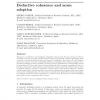Free Online Productivity Tools
i2Speak
i2Symbol
i2OCR
iTex2Img
iWeb2Print
iWeb2Shot
i2Type
iPdf2Split
iPdf2Merge
i2Bopomofo
i2Arabic
i2Style
i2Image
i2PDF
iLatex2Rtf
Sci2ools
107
click to vote
IGPL
2010
2010
Deductive coherence and norm adoption
This paper is a contribution to the formalisation of Thagard’s coherence theory. The term coherence is defined as the quality or the state of cohering, especially a logical, orderly, and aesthetically consistent relationship of parts. A coherent set is interdependent such that every element in it contributes to the coherence. We take Thagard’s proposal of a coherence set as that of maximising satisfaction of constraints between elements and explore its use in normative multiagent systems. In particular, we interpret coherence maximisation as a decision-making criterion for norm adoption. We first provide a general coherence framework with the necessary computing tools. Later we introduce a proof-theoretic characterisation of a particular type of coherence, namely the deductive coherence based on Thagard’s principles, and derive a mechanism to compute coherence values between elements in a deductive coherence graph. Our use of graded logic helps us to incorporate reasoning under ...
Related Content
| Added | 27 Jan 2011 |
| Updated | 27 Jan 2011 |
| Type | Journal |
| Year | 2010 |
| Where | IGPL |
| Authors | Sindhu Joseph, Carles Sierra, W. Marco Schorlemmer, Pilar Dellunde |
Comments (0)

